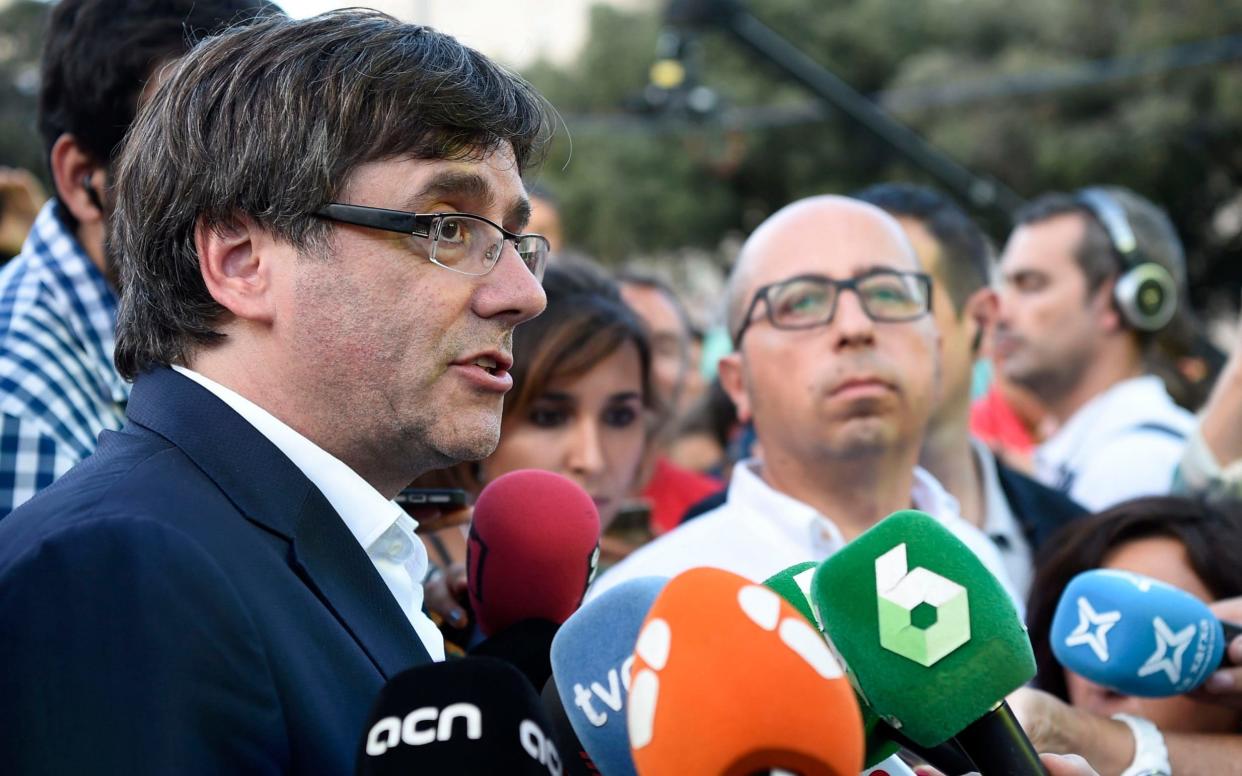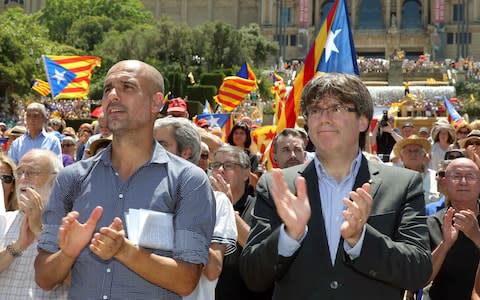Spanish government accused of interfering in judicial proceedings to discredit Catalonian politicians

The Spanish government has been accused of conducting a smear campaign against Catalonian politicians in a bid to discredit this week's independence referendum after a judge ordered police to investigate a corruption case involving the Catalan President.
Spanish police searched the premises of companies connected to the council in the city of Girona, where Carlos Puigdemont served as mayor between 2011 and 2016, a day before raids on Catalan government buildings saw 14 arrests in an operation targeting referendum operations.
A judge in Girona is investigating alleged kickbacks of €15 million from private water companies to city politicians, an arrangement believed to stem from the 1990s, long before Mr Puigdemont became mayor.
The probe was launched after a complaint by local councillors from the Left-wing pro-independence CUP party, who now complain about the suspicious timing of the raids.
“We reported this in 2015. All that time there has been enough evidence on the table for the raids to have taken place in the past year. But they happen now, just 10 days before the referendum,” said councillor Lluc Salellas.
“Operation Catalonia is back,” said Catalan government spokesman Jordi Turull using the name given to a secret police probe over recent years that has led to a judicial investigation into a former Catalan president, and media-aired allegations of corruption against pro-independence leader Artur Mas and a former mayor of Barcelona.

The accusations gained steam on Thursday when the Spanish parliament approved the conclusions of a cross-party commission that under former interior minister Jorge Fernández Díaz, elements within the national police force had “pursued political opponents”.
The report describes the activities of a “political police brigade” that used state funds to seek information about the government’s political adversaries.
It cited cases such as that of Pablo Iglesias, leader of the Left-wing Podemos party, who has fought off media reports and two attempted prosecutions regarding allegedly illegal payments from the governments of Venezuela and Iran.

The government of conservative Prime Minister Mariano Rajoy denies meddling in judicial investigations.
“Crimes are pursued by judges with complete independence, whether it’s corruption in Girona city hall or any other place in Spain,” a spokeswoman for the Spanish government said.
“The government merely complies with the law, and ensures that laws are complied with.”
Xavier Trías, a Catalan nationalist former mayor of Barcelona, is also mentioned in the parliamentary report as being the victim of an undercover smear campaign which led to the publication of allegations that he held millions in Swiss and Andorran bank accounts.
Mr Fernández Díaz left Mr Rajoy’s Cabinet last year, shortly after recordings were published by the online newspaper Público that purport to shows the then-interior minister discussing with the head of Catalonia’s independent Anti-Fraud Office how possible accusations of wrongdoing against pro-independence politicians can be “fine-tuned” with help from prosecutors and planting the stories in the media.
Asked by The Telegraph for a response to the conclusions of the parliamentary report, a government spokesperson placed the findings within the “ambit of political debate”, pointing out that a judicial investigation into Mr Díaz Fernández and the contents of the tape was shelved.
The Catalan government is convinced that there is a systematic strategy to discredit its leaders as they plan their drive towards independence.
“First it was Artur Mas, who was supposed to be totally corrupt, now it’s Puigdemont, and then it will be whoever is next. They’ll do whatever it takes to avoid finding a political solution,” a source close to Mr Puigdemont told The Telegraph.
Mr Puigdemont, a former journalist who says he will not seek a second term in Catalonia’s next elections, has said that he will face “all the consequences” when asked if he would be prepared to go to jail for the independence cause.
“If they make that mistake, it will be their last. All Catalonia would take to the streets if the president were put in prison,” the source added.
Mr Mas, who is currently barred from public office after being found guilty of disobedience for holding an unconstitutional ballot on independence in 2014, recently told Spain’s LaSexta TV channel that the “state sewer stinks” when recalling newspaper reports that appeared shortly before the 2012 regional election, citing fraud squad evidence that he had secret bank accounts in Switzerland and Liechtenstein.
No charges were brought against Mr Mas relating to these allegations.
“Without that defamation and disgusting montage, my party would have won more votes and seats in that election."

